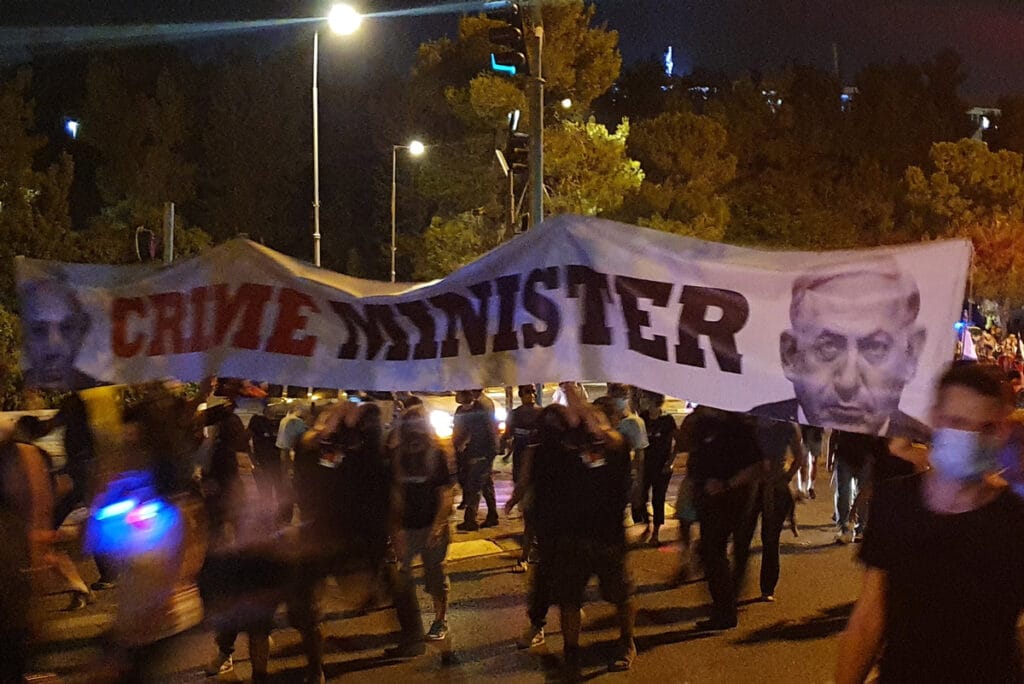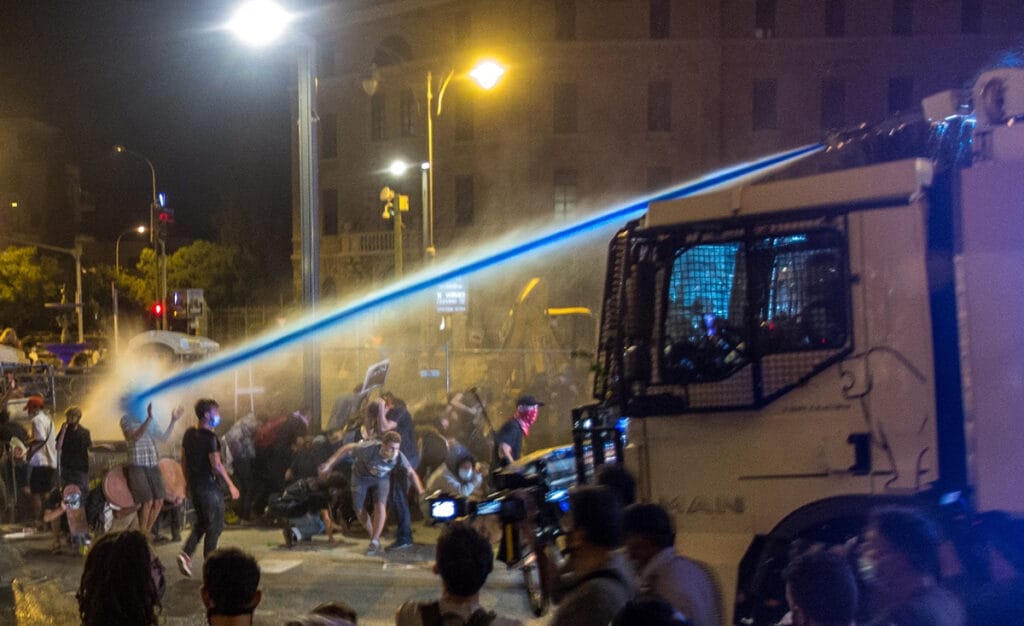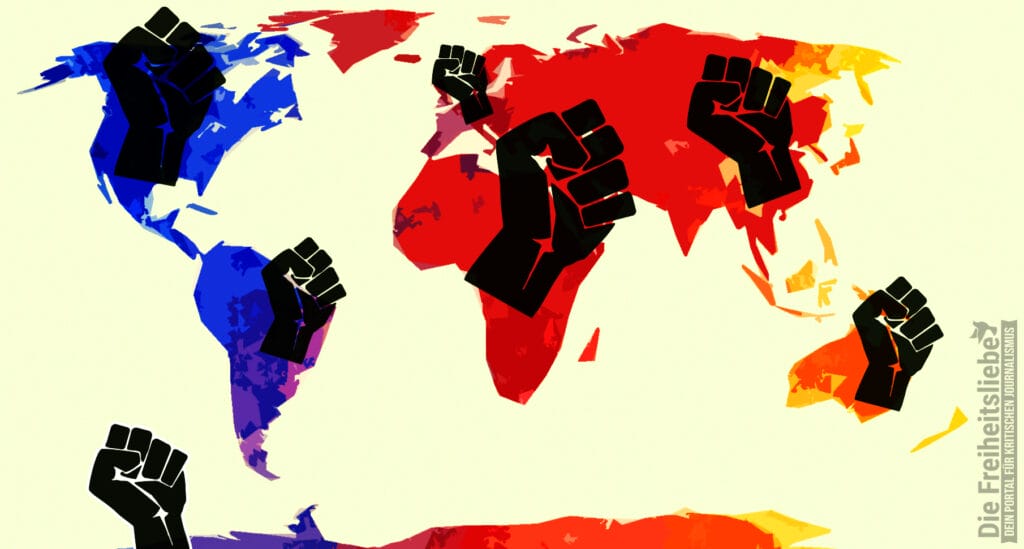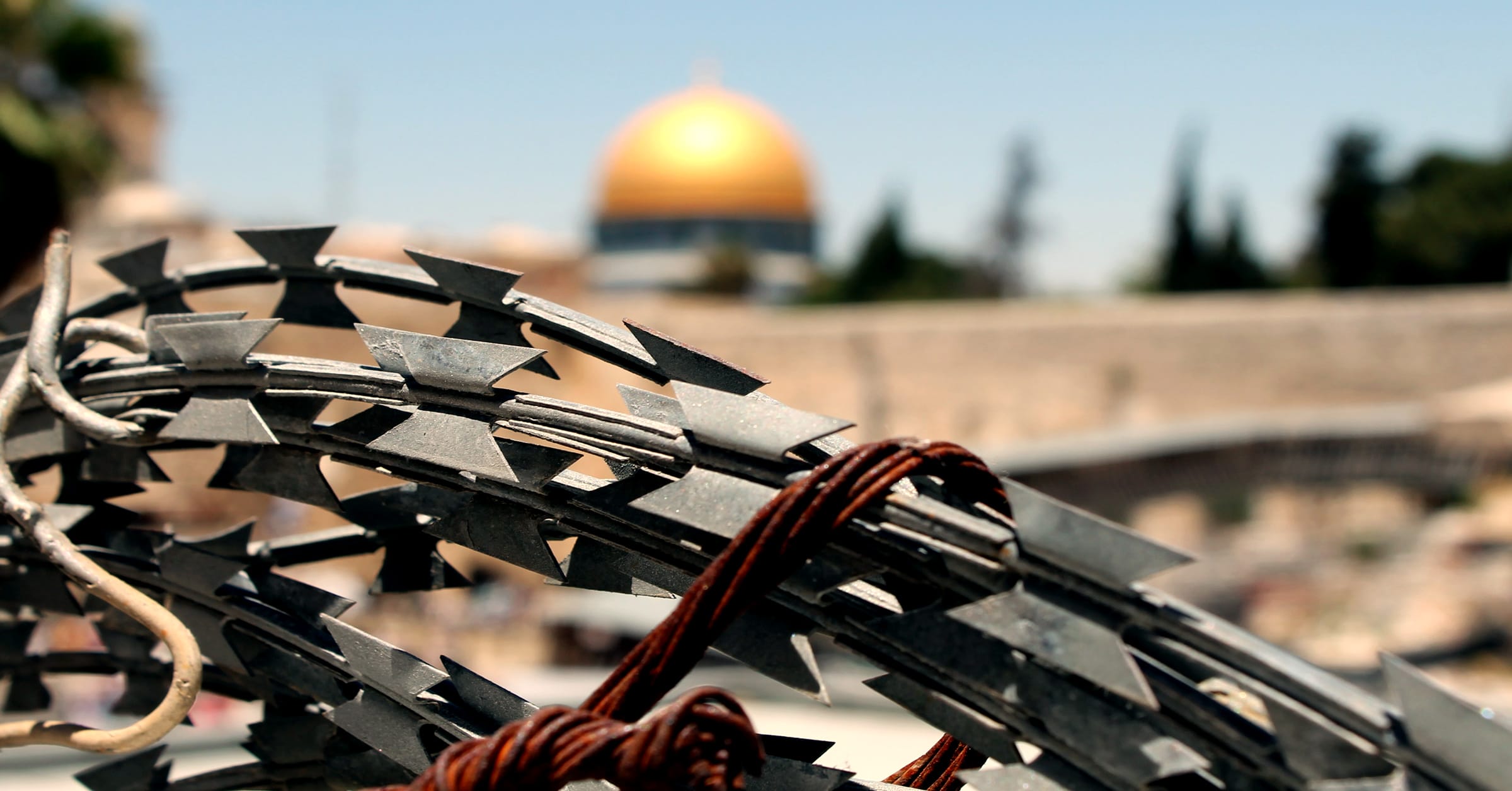The Israeli political landscape seems to shift more and more to the right. With an endlessly ongoing occupation of the Palestinian Territories and treatment of Israeli Palestinians as second-class citizens progressive approaches from the left may be more important than ever, both from political parties and the extraparliamentary opposition.
In order to unravel Israeli politics and look for a way forward we talked to a communist Israeli activist.[i]
Die Freiheitsliebe: The famous Israeli veteran columnist Gideon Levy wrote in January 2019, “In Israel, There’s No Left. There’s Only a Right in Different Forms”. Levy argues that all parties are mere iterations or split-offs of Likud and that the left parties are either insignificantly small (Meretz) or highly ostracized and thus isolated (Joint List). Is Levy right in his assessment?
To completely write off Levy’s critique would be dishonest, but I think Levy does recognize an Israeli left exists as he himself is an Israeli leftist.
The Israeli left is both a disadvantage (which Levy reflects on in the aforementioned article) and a great advantage. As the opposition to Prime Minister Netanyahu grows, we have a large number of dissatisfied Israelis looking for a direction.
We, as activists, as opponents of the occupation and proponents of peace, as a truly left wing must reach these people and rally them under common ideas. While some participants of the protests against Netanyahu focus solely on his resignation, a growing number of activists are pushing radical plans for the day after Netanyahu is gone. Activists of Hadash, Zazim, All That’s Left, Free Jerusalem, „The Anti-Occupation Block“ (Gush Neged Hakibush) and others form a leftist faction within the recent protests with slogans demanding justice for the Palestinian Eyad Al-Hallaq who was murdered by police, as well as „democracy for all“ (not just the [Ashkenazi] Jews) and an end to the occupation of Palestine. We haven’t rallied the entire country to the left yet, that’s true. But truly leftist Israelis are represented both by the Joint List in Parliament and by its parties and other organizations on the streets.

For months, thousands of people have taken to the streets in Israel demanding the resignation of Prime Minister Netanyahu. By Nir Hirshman Communication, Wikimedia Commons, licensed under CC BY-SA 4.0.
Die Freiheitsliebe: Besides parties, how strong are leftist, progressive and emancipatory movements or organizations in Israel? Are there examples of concrete successes of these movements or that they were even able to pressure legislation in the Knesset in one way or another?
One has to look at success under a pragmatic lens. When one unionizes workers in Germany, will it abolish capitalism? Of course not, but when the call to arms is heard in the future, we will see the profit from these investments tripled.
Victories such as July 1st passing without the annexation of Area-C in the occupied West Bank despite grandiose claims by the government in advance to do so, as well as ending the administrative detention of Maher Al-Akhras after his long hunger strike and countless protests may not be the end of the occupation, but they are absolutely a part of the larger struggle and these are just two examples from this year. Parties, politicians, organizations, groups and activists are all a part of this.
In that sense, even a smaller victory such as raising the minimum wage by about 4 Shekel per hour [about 1 Euro, editor’s note] from 2011 to 2015 is a victory and it has always been a collaboration of efforts both at the parliament and on the streets.
Die Freiheitsliebe: What would you identify as the main area of division in actual domestic politics, i.e. besides the “Creed” of pro or con Bibi?
One has to understand the particular conditions of every country. In your question you speak of domestic politics, but what is domestic in an occupying country? Are invasions by the IDF to Palestinian houses in the West Bank a domestic issue or are they foreign? What even is the border of Israel right now? That is a question we all have to confront.
One has to remember how Netanyahu said on the election day of 2015 that „The Arabs are coming to vote in droves“ and that leftists are driving „them“ by busses. It will be extremely hard to truly solve our domestic issues without tackling inequality, racism towards Palestinian citizens of Israel and the occupation of Palestine.
Die Freiheitsliebe: How do leftist strategies to approach these issues look like?
One has to separate strategy from tactics. The truth is we are not fortune tellers and we have no crystal balls to consult. We don’t know how the occupation will end or how we will achieve equality in Israel as no other progressive movement ever did. Could the civil rights movement in the 1950s in the US know that the murder of Emmett Till will shake the country? Or whether Sit-Ins are an effective tool for struggle or not? Could a prisoner in Auschwitz know whether the Red Army will emerge victorious against fascism?
Hadash, Combatants for Peace and others offer places where Jews and Arabs struggle together, not just to expand the membership numbers but on the principle of co-resistance, while other groups such as All That’s Left espouse ideas of direct action and Breaking the Silence shapes public opinion by exposing the occupation through testimonies of soldiers. The left in Israel is diverse, our task is to push things forward, towards a better future.
Die Freiheitsliebe: During the last election campaigns (3 elections in 11 months), politics or policies seemed to be almost non-existent – all campaigns revolved around Netanyahu as the all-consuming person of conflict. Would you more or less share that assessment? Where does that Bibi obsession even come from?
I would definitely disagree. While the main focus of election periods is the question of Netanyahu, many dedicated parties, organizations and activists wage a variety of different struggles. Even at the protests next to Netanyahu’s house in Jerusalem one can notice signs denouncing the occupation, police brutality and even climate change. The current protest movement, while focused on Netanyahu, has managed to attract all active forces to join the movement, this creates a certain harmony one can notice in the protests, where the bigger „anti-Netanyahu“ movement is radicalized by ideas brought to the table by the leftist groups who participate in it while remaining rather un-radical in its essence. The simpler, less radical majority just has to accept the presence of the left in these protests and it does. In that sense, it’s not that this movement as a whole has more demands or ideas than the resignation of Netanyahu, but it hosts these ideas as a part of it.

During anti-Netanyahu protests on July 23, police shot blue water in the face of a protester from a short distance. By Or Barenholtz, Wikimedia Commons, licensed under CC BY-SA 3.0.
This is reflected in the elections as well, the Joint List rallied the Arab (and Jewish leftist) voters against racism and occupation, both as the List and during one of the elections when it was split up into Hadash-Ta’al and Ra’am-Balad. To name another example, the Ashkenazi Orthodox-Jewish party Torah Judaism made videos in one of their campaigns aimed at secular people, denouncing incitement against Orthodox Jews. A smaller far-right party that supports free market economics by the name of Zehut („Identity“) also had legalization of cannabis as a main part of their campaign.
Die Freiheitsliebe: For an outsider observing the election campaigns, especially the silence on Palestine was deafening. Is that even still an issue in the Israeli public?
It’s an issue when the government makes it an issue. A feeling of „Arab threat“ helps right-wing parties and candidates gain votes. Leftists constantly make an effort to bring the occupation to the public’s eye, sometimes new campaigns pop up and that’s very important of course. It’s interesting that you mention silence because I wouldn’t say that. The threat of Trump’s plan of the annexation of area-C was answered by a massive public movement, it wasn’t perfect and anti-Arab racism was present in many of its Zionist elements, but it had many actually leftist leading elements and it worked, annexation did not happen on its planned date in July.
The racism in the movement was expressed as fear from coexistence, which was very sad to see. Thousands of Arabs and Jews from a variety of parties and organizations participated together in a protest at Rabin Square in Tel Aviv, raising Palestinian flags and opposing annexation together, nothing can change how impressive that is.
Die Freiheitsliebe: What is the strategy from leftist parties or movements to solve the decades-old Palestine-Israel conflict in a sustainable manner?
That depends on the parties and movements. Within the anti-occupation camp, some are against Zionism and some identify with it, some support a two-state solution while others want a single democratic state, some even offer a confederacy. Strategically speaking, each group uses a variety of methods to fight the struggle. Our combined efforts are all a part of what makes our struggle meaningful and effective.
I can say for myself that I find cooperation between Jews, Palestinian citizens of Israel and Palestinians living in the occupied territories very important. Be that as it may, I use to word cooperation carefully. Some peace movements and projects espouse a very depoliticized idea of cooperation, kids painting together, dancing or playing football. This normalization of relation may feel very meaningful to Israelis that may be meeting Palestinians for the first time in their lives through these projects, but this ignores the unequal reality we live in. Joint educational activities must focus on the occupation and Zionism in order to be meaningful rather than „hippie“. Joint struggles must put the occupation and inequality under the spotlight. Otherwise it is not peace that they’re working for but rather normalization of the present state of things.
Die Freiheitsliebe: On the global stage, besides informing and educating about the conflict, the Boycott, Divestment and Sanctions movement (BDS) offers some of the very few tools to exert pressure on the Netanyahu government. In Germany, there are struggles put before the courts in order to fight against the declaration of the Bundestag denouncing BDS sweepingly as “antisemitic”. BDS can be viewed as an attack on your economy and politics, your culture and science even. As an Israeli, what’s your stance on BDS?
One can’t boycott one’s own self, so any opinion I have on BDS is in a way an insider’s view on the subject and an outsider’s view on the tactic. Boycott, divestment and sanctions are clearly non-violent and democratic ways to wage a struggle, there is no way to argue otherwise, just none. Their demands are also fair and are only an echo of international law, if their demands (an end to the occupation, equal rights to Palestinian citizens of Israel and a solution for Palestinian refugees in accordance with UN resolution 194) are antisemitic that would mean international law is antisemitic, “good luck” banning the UN.
Be that as it may, I have interacted with people associated with BDS that were not sufficiently educated on their principles of anti-normalization, ones who rejected a joint struggle of Israelis and Palestinians against the occupation. While these cases are common, I do not think this makes the BDS movement illegitimate. I have also heard legitimate voices raising concern over antisemitic actions and opinions of specific BDS activists and groups and I hope their movement can provide efficient solutions to such cases.
While I do not see myself as a part of the BDS movement itself, I do recognize that recent attempts to delegitimize their non-violent tactics to fight the occupation are a concern for any person seeking peace and justice.
Die Freiheitsliebe: The Netanyahu government obsesses with the notion that the Iranian regime poses an existential threat to Israel. In my opinion, this threat is cooked up and Bibi needs it as a main source of self-legitimization. What is your take of the conflict? How should progressive and peace-oriented movements approach it?
The fear of Iranian attacks plays a very important role in Netanyahu’s politics and he gains a lot of credit for „security“, absolutely. Israel constantly attacks Iranian targets in Iran, Lebanon and Syria and our public praises these actions. I believe this comes from a misunderstanding of how war works and the meaning of these actions. If an Israeli general responsible for acts of war was assassinated by Iran it would be seen as a declaration of war in the public’s eye, but the opposite is not understood that way here. This is, of course, only the domestic and popular state of things without even touching on the issue of Israeli support given to the Mujahedin E-Khalq that works to topple the Iranian government. I feel the pain of Iranians suffering from Israeli imperialist aggression exactly the way I feel the pain of Palestinians suffering under the occupation. I can only hope that our work to bring a reasonable analysis of these acts to the public’s eye will be successful.
Thank you very much.
[i] The interview was held by Jakob Reimann on December 5 for Die Freiheitsliebe. The identity of the activist is known to Die Freiheitsliebe.
Hier geht’s zu unserer Reihe Neue Linke, in der wir Personen aus linken Bewegungen und emanzipatorischen Kämpfen weltweit zu Wort kommen lassen.

Abonniere unseren Newsletter:
The shortcode is missing a valid Donation Form ID attribute.






